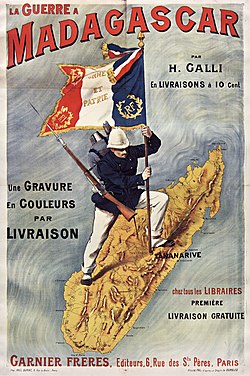Franco-Hova War
| Franco-Hova Wars (1883-95) |
|||||||
|---|---|---|---|---|---|---|---|
| Part of the French colonial wars | |||||||
 French poster about the "Madagascar War" |
|||||||
|
|||||||
| Belligerents | |||||||
|
|
|
||||||
| Commanders and leaders | |||||||
|
|
|
||||||
French victory
The Franco-Hova Wars or Franco-Malagasy Wars comprised two French military interventions in Madagascar between 1883 and 1896 that overthrew the ruling monarchy of the Merina Kingdom, and resulted in Madagascar becoming a French colony. Hova refers to a class within the Merina social structure.
European colonial powers, primarily Britain and France, had ambitions to control Madagascar, a rich island with strategic importance in regard to the sea passage to India. The Merina Kingdom of Madagascar had successfully repelled multiple attempts by both European powers to seize control of the territory throughout the 19th century. Defense of the island was aided by its size and diversity of terrain, the nation's organized military and government structures, and the prevalence of tropical diseases. The first significant European influence in Imerina was the arrival of a handful of British missionaries in the capital of Antananarivo in 1820 during the reign of Radama I, who invited them to establish schools and teach the Merina free populace to read. Several years into the reign of Queen Ranavalona I, which began in 1828, the monarchy became increasingly disapproving of the growing popularity of the Christianity that the missionaries had introduced, and encouraged them to cease teaching religion while continuing to provide technical and vocational training to create a cadre of skilled craftsmen. She successfully repelled French attacks on Foulepointe and other coastal cities. During several periods, Ranavalona's restrictions on the practice of Christianity minimized European presence on the island.
Upon Ranavalona's death, her son succeeded her as King Radama II in 1861. As prince, he had already made concessions to Joseph-François Lambert, a Frenchman who had resided at Ranavalona's court and assisted in the development of numerous resources. The Lambert Charter Radama had approved conceded significant tracts of land to Lambert in neglect of the island-wide significance attached to ancestral land. In addition, the French government received a letter purportedly written by the prince, requesting French military aid to depose his mother. The origins and authenticity of the letter are disputed, and the British alleged that it was crafted by Laborde (particularly since it was written in French, a language Radama did not know how to write) to support French military action on the island.
...
Wikipedia
